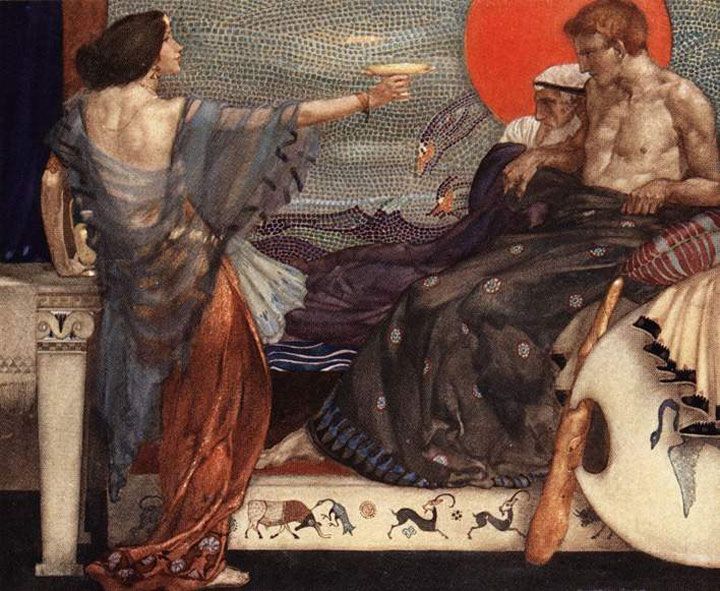| week |
readings |
assignments/holidays |
topics &
arguments |
Week 1:
January 14, 16
|
Ovid: Book I
Tatlock 1 (Olympians: Zeus),
Tatlock 2 (Olympians continued)
|
|
Creation myth vs. succession myth;
types of myth.
Polytheism vs. monotheism.
Can immortal gods be heroic?
What’s an iconic attribute? What’s a sphere?
Attack or defend: Zeus will not reign forever.
Attack or defend: Zeus is Jupiter.
Attack or defend: Zeus is both the oldest and the youngest
child of Cronus.
|
Week 2
January 21, 23
|
Ovid: Book II
Tatlock 3-4 (Olympians continued)
handout on the
(so-called) 12 Olympians
|
|
Patriarchy vs. pre-patriarchy.
Why are there female gods in a patriarchal religion?
Attack or defend: Hera should get a divorce.
Attack or defend: the Greek gods are bound by moral laws.
Three is a magic number.
The Sun is a terrible parent.
|
Week 3
January 28, 30
|
Ovid: Book III
Tatlock 5-6 (Olympians continued)
|
|
6 + 8 = 12. Discuss.
Interpretatio
Romana.
Attack or defend: Odin is Mercury.
Attack or defend: Cupid is more powerful that Apollo.
Is Zeus good or evil? Why? What about other gods in the
myths?
Attack or defend: bears have tails.
|
Week 4
February 4, 6
|
Ovid: Book IV
Tatlock 7 (lesser Olympians)
|
Tuesday February 4:
Quiz 1
(readings &
lectures
weeks 1-3) |
Why do sexual relations between gods
and mortals always seem to result in harm to mortals?
Attack or defend: Ovid approves of sexual violence.
Was Niobe right or wrong?
Attack or defend: the story of Cupid & Psyche is not a
myth.
|
Week 5
February 11, 13
|
Ovid: Book V
Tatlock 8-9 (gods of sea and Earth)
|
Friday February 14,
11:59 PM:
Argument 1
(readings &
lectures
weeks 1-5)
|
Attack or defend: Dionysus is the
most merciful Olympian.
Attack or defend: Ceres is a closer match to Persephone
than to Demeter.
Attack or defend: Poseidon is not really a sea god.
Attack or defend: Dionysus is a version of Zeus.
Attack or defend:Greek gods are immortal.
|
Week 6
February 18, 20
|
Ovid: Book VI
Tatlock 10 (World of the Dead)
|
|
Attack or defend: all religions have pretty much
the same idea about the afterlife.
Measure a hero on the Raglan scale.
How does guilt culture influence notions of the
afterlife?
Attack or defend: Hades is not an Olympian.
Attack or defend: Tantalus deserved what happened to
him.
(You could also argue this about Sisyphus, Ixion,
Tityus, the Danaides, etc.)
|
Week 7
February 25, 27
|
Ovid: Book VII
Tatlock 11 (Argos),
Tatlock 13.3 (Corinth)
The Raglan Scale
|
Thursday February 27:
Quiz 2
(readings
& lectures
weeks 4-7)
|
Attack or defend: No real myths from
Greek antiquity survive.
Who’s the greater hero, Perseus or Bellerophon?
Is a hero someone you’re necessarily supposed to admire
and imitate?
Are the gods people you’re necessarily supposed to admire
and imitate?
Measure a Greek hero on the Raglan Scale. How do they
score?
Attack
or defend:The Raglan Scale is biased towards patriarchal
heroes.
|
March 1-9: Spring Break
(no classes)
|
Week 8
March 11, 13
|
Ovid: Book VIII
Tatlock 15 (Thebes)
|
|
What is overdetermination and how
does it relate to myth?
Attack or defend: Thebes is the Greek city that’s most
like Rome.
Was Oedipus morally responsible for his crimes?
Attack or defend: Oedipus was a greater hero than Cadmus.
Consider Zeus’ sexual partners and the variety of ways he
gets together with them. Does he have some sort of
problem?
Attack or defend: Amphion & Zethus are 1 hero in 2
parts.
Attack or defend: Creon was a better king than any member
of Oedipus’ family.
|
Week 9
March 18, 20
|
Ovid: Book IX
Tatlock 12 (Heracles)
|
|
Hercules, or Jerkules?
Attack or defend: Heracles is the least Greek of all the
Greek heroes.
How many different versions of Heracles are there?
So: athloi and parerga. What’s the
difference?
What’s the best Heracles adventure? What’s the worst?
Did Heracles ever travel to Rome?
What’s the common theme in the labors of Heracles (if
there is one)?
|
Week 10
March 25, 27
|
Ovid: Book X
Tatlock 13.1 (Crete),
Tatlock 14 (Attica)
|
Thursday
March 27
Quiz 3
(readings & lectures
weeks 8-10)
|
Theseus: half the hero that Heracles
was?
Theseus had two fathers. Discuss.
What’s the common theme in the labors of Theseus (if there
is one)?
Would you want your friend to date Theseus? Why or why
not?
Attack or defend: Daedalus was a hero.
The Minotaur was a monster, half-man and half-bull. Which
half made him a monster?
Attack or defend: Ariadne was a kinslayer.
|
Week 11
April 1, 3
|
Ovid: Book XI
Tatlock 13.2 (Sparta),
Tatlock 13.4 (Aetolia),
Tatlock 16 (Argonauts)
|
Friday April 4
11:59 PM:
Argument 2
(readings &
lectures
weeks 6-11)
|
"ARGONAUTS ASSEMBLE!" Crossover stories in Greek
myth.
Attack or defend: Althaea was a good mother.
"Forty or fifty feral hogs": what’s with all these pig
monsters?
Attack or defend: Atlanta was transgender.
Attack or defend: Jason was the least important hero on
the Argo.
Attack or defend: Medea was a pre-patriarchal hero, who
became a monster in patriarchal storytelling.
The female descendants of the Sun share some striking
features. What are they? Why are they like that?
|
Week 12
April 8, 10
|
Ovid: Book XII
Tatlock 17 (Trojan War)
|
|
The Epic Cycle: How Homeric is it?
Attack or defend: the Trojan War has more causes than are
really necessary, for storytelling purposes.
Attack or defend: Achilles was a big bloodthirsty baby who
never grew up.
How old is Achilles when the war begins? How old is
Neoptolemus when he enters the war?
Was Agamemnon the dumbest character in Greek mythology, or
the dumbest character in any mythology? Discuss.
|
Week 13
April 15, 17
|
Ovid: Book XIII
Tatlock 19 (Agamemnon),
Tatlock 18 (Odysseus)
|
|
If Odysseus told you something, would you believe
him?
Attack or defend: Hector is a greater hero than
Achilles.
Who deserved to win the armor of Achilles?
Is the Trojan War an anti-war story or a pro-war story,
or something else?Attack or defend: most Roman
myths are legends.
|
Week 14
April 22, 24
|
Ovid: Books XIV, XV
|
Thursday April 24:
Quiz 4
(lectures
& readings weeks 11-15)
|
If someone compared you to Romulus,
would you be flattered?
Like
Dionysus, like Heracles, like Aeneas, like Romulus,
like Julius Caesar,
Hippolytus was a mortal man who became a god. Discuss.
Attack or
defend: the Metamorphoses is a satire at Augustus’
expense.
Was Ovid a fan of Vergil?
Attack or
defend: Ovid was a vegetarian.
Apotheosis:
did Ovid really believe in it? If not, why does he talk
about it?
“Omnia mutantur; nihil interit.” Discuss.
Attack
or defend: the Metamorphoses is one big commercial
for the Roman Empire.
|
Finals Week
April 28-
May 2
|
|
Final Project due
Wednesday April 30
(11:59 PM)
|
Ovid's Metamorphoses & mythology.
Use and cite the required texts, especially Ovid;
don't do "research" (i.e. aimlessly Google stuff).
|


